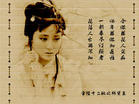《红楼梦》诗词歌赋
1 无才可去补苍天,枉入红尘若许年;此系身前身后事,倩谁记去作奇传?
Unfit to mend the azure sky, I passed some years on earth to no avail;
My life in both worlds is recorded here, Whom can I ask to pass on this romantic tale?
“不适合用来修补蔚蓝的天,我在尘世间度过了一些年,却毫无作为;我在两个世界的生活都记载在这里,谁可以帮我将这个浪漫的故事流传下去?”
2 满纸荒唐言,一把辛酸泪!都云作者痴,谁解其中味?
Pages full of fantastic talk, Penned with bitter tears;
All men call the author mad, None his message hears.
“满纸都是奇异的言论,笔下浸满了心酸的泪水;所有人都说这作者疯了,他想要传递的信息却没有人知道”。
说不上好坏,意思倒是都传达出来了,对仗也还不错,tears与hears押韵,应该说汉语古诗能译到这样已经不易。
3 惯养娇生笑你痴,菱花空对雪嘶嘶;好防佳节元宵后,便是烟消火灭时。(癞头僧吟英莲)
Fool, to care for this tender child,
An image in the mirror, snow melting away.
Beware what will follow the Lantern Feast,
The vanishing like smoke when the fire burns out.
“愚蠢啊,去关心这个稚气的孩子! 镜中的幻影,雪花化尽。 小心元宵节后要来的事, 当大火熄灭后,像烟雾一般消逝。”
完全变换成了西方诗歌的咏叹语气。最失败之处当属第二句,原本的“菱花”寓指“香菱”没有表现出来,这样单纯一译使人入赘云里雾里,不知所指。
4 未卜三生愿,频添一段愁;闷来时敛额,行去几回头;自顾风前影,谁堪月下俦?蟾光如有意,先上玉人楼!(贾雨村风尘怀闺秀诗)
Not yet divined the fate in sore for me,
Good reason have I for anxiety,
And so my brows are knit despondently,
But she, as she went off, looked back at me.
My shadow in the wind is all I see,
Will she by moonlight keep me company?
If sensibility were in its power,
The moon should first light up the fair one’s bower.
这首诗一经翻译倒是令人豁然开朗,以往看原文不解的一些地方倒明白了。因为译文变得浅显易懂.
5 时逢三五便团圆,满把晴光护玉栏;
天上一轮才捧出,人间万姓仰头看!(贾雨村口占一绝)
On the fifteenth the moon is full,
Bathing jade balustrades with her pure light,
As her bright orb sails up the sky,
All men on earth gaze upwards at the sight.
对于贾雨村的这些诗不想多做分析。只是要提一点,对于“玉”的翻译难题。“玉”在国人眼中乃是纯,美,净等几乎是一切美好的化身,因此才有了“宝玉,黛玉,红玉”等一系列“玉”名,也才有了在诗中用“玉”形容美丽的事物。但是,在西方文化中,“玉”的隐含意义并不好,有“轻佻,不洁”的意思,因此有老外将“黛玉”译为“黑色的玉石”才会引起重大误会。
6《好了歌》
世人都晓神仙好,惟有功名忘不了!
古今将相在何方?荒冢一堆草没了!
世人都晓神仙好,只有金银忘不了!
终朝只恨聚无多,及到多时眼闭了。
世人都晓神仙好,只有娇妻忘不了!
君生日日说恩情,君死又随人去了。
世人都晓神仙好,只有儿孙忘不了!
痴心父母古来多,孝顺儿孙谁见了?
All men long to be immortals
Yet to rich and ranks each aspires;
The great ones of old, where are they now?
Their graves are a mass of briars.
All men long to be immortals
Yet silver and gold they prize,
And grub for money all their lives
Till death seals up their eyes.
All men long to be immortals
Yet dote on the wives they’ve wed,
Who wear to love their husband evermore
But remarry as soon as he’s dead.
All men long to be immortals
Yet with getting sons won’t have done.
Although fond parents are legion,
Who ever saw a really filial son?
《好了歌》的消极色彩是十分明显的,但是我们还不能简单地把它视为糟粕抛弃它。因为作者拟作这首《好了歌》,是对他所厌恶的社会现实的一种批判,尽管是一种消极的批判,也有它的价值。作者出身于一个上层的封建世家,亲自观察了这个阶级的腐朽、堕落,亲身体验了贵族阶级由兴盛到衰败的苦痛,进行了半生深沉的思索,激起他强烈的愤感,他要痛骂,他要诅咒,《好了歌》便是痛骂的歌、诅咒的歌。作者的感情是十分复杂的。他倾注一腔心血,虚构了大观园那样一个如诗如画的环境,塑造了那么多善良纯洁的少女形象,描绘了那么多有情有趣的事物,可见,作者是多么懂得生活,有着多么高雅的生活情趣呀!有爱必然有憎,他描写贾赦、贾珍、贾琏之流猪狗不如的品德和行为,就是对他憎恶的对象的鞭苔。而最后,无论他所爱的还是他所憎的,都一齐毁灭了,就使他堕入一种难以解脱的精神痛苦之中。了解了作者的生活态度,再看他写的这类具有虚无色彩的东西,就能够把它放到适当的地位去理解了。也就是说,作者世界观中尽管有虚无消极的一面,但同无爱无憎的和尚道士不同;如果没有深厚的生活激情,岂能写出这样一大部博大精深的《红楼梦》来?
7 《好了歌》注解
陋室空堂,当年笏满床;
衰草苦杨,曾为歌舞杨。
蛛丝儿结满雕梁,
绿纱今又糊在蓬窗上。
说什么脂正浓,粉正香,
如何两鬓又成霜?
昨日黄土陇头埋白骨,
今宵红绡帐底卧鸳鸯。
金满箱,银满箱,
转眼乞丐人皆谤。
正叹他人命不长,
哪知自己归来丧?
训有方,保不定日后做强梁。
择膏梁,谁承望流落在烟花巷!
因嫌纱帽小,致使枷锁扛;
昨怜破袄寒,今嫌紫蟒长。
乱哄哄你方唱罢我登场,
反认他乡是故乡;
甚荒唐,
到头来都是为他人做嫁衣裳。
Mean huts and empty halls
Where emblems of nobility once hung;
Dead weeds and withered trees,
Where men have once danced and sung;
Carved beams are swathed in cobwebs
But briar-choked casements screened again with gauze;
While yet the rouge is fresh, the powder fragrant,
The hair at the temples turns hoary-for what cause?
Yesterday, yellow clay received white bones;
Today, red lanterns light the love-birds’ nest;
While men with gold and silver by the chest
Turn beggars, scorned by all the dispossessed.
A life cut short one moment makes one sight,
Who would have known it’s her turn next to die?
No matter with what pains he schools his sons.
Who knows if they will turn to brigandry?
A pampered girl brought up in luxury
May slip into a quarter of ill fame;
Resentment at a low official rank
May lead to fetters and a felon’s shame.
In ragged coat one shivered yesterday,
Today a purple robe he frowns upon;
All’s strife and tumult on the stage,
As one man ends his song the next comes on.
To take strange parts as home
Is folly past compare;
And all our labour in the end
Is making clothes for someone else to wear.
这篇解注比《好了歌》说得更具体、更形象、更冷峭无情。富贵的突然贫贱了,贫贱的又突然富贵了;年轻的突然衰老了,活着的又突然死掉了——人世无常,一切都是虚幻。想教训儿子光宗耀祖,可他偏偏去当强盗;想使女儿当个贵妇,可她偏偏沦为娼妓;想在官阶上越爬越高,可是偏偏成了囚徒——命运难以捉摸,谁也逃脱不了它的摆布。可是世上的人们仍不醒悟,还在你争我夺,像个乱哄哄的戏台,闹个没完。这就是《好了歌》解注的基本思想。它同《好了歌》一样,同属馈世嫉俗的产物。由于它处处作鲜明、形象的对比,忽阴忽晴,骤热骤冷,时笑时骂,有歌有哭,加上通俗流畅,迭富有致,就使它具有强烈的感染力。它对于当时封建社会名利场中的人物,无异于一盆透顶醒心的冷水;对于今天的人们认识封建社会的腐败黑暗,也有某种认识意义。
这首《好了歌》解注,在全书开头造成一种“忽荣忽枯、忽丽忽朽”(脂砚斋语)的险恶气氛,也是对全书荣宁二府兴衰际遇的一种概括和预示。
这种概括和预示,是就其整体而言的,不好说哪一句是专指哪个或哪几个人物。如有人以为“转眼乞丐人皆谤”指的是甄宝玉和贾宝玉;“绿纱今又糊在蓬窗上”指的是贾雨村等人;“因嫌纱帽小,致使锁枷扛”指的贾雨村、贾赦等人;“昨怜破袄寒,今嫌紫蟒长”指的是贾兰、贾菌等人,等等。乍看似乎有点像,其实未必是作者的意图。既然是概括地预示全书内容,有些像是自然的,但如简单地把每句和书中人物一一对应起来,就无法解释通。如以为“训有方,保不定日后作强梁”指的是柳湘莲,有什么根据?书中根本没有写柳湘莲之父是谁,也没写如何教子有方,也没有其它预示说柳湘莲要当强盗,怎么能证实就是指的柳湘莲?更有人据此说柳湘莲参加了农民起义等等,就近乎痴人说梦了。持上述看法的研究者,依据的是“甲成本”脂批。脂砚斋批语对研究《红楼梦》有其不可忽视的价值,但也不可尽信和迷信。脂批是个很复杂的问题,肯定不是出自一人一时,错讹之处很多,因此有取也要有弃,与《红楼梦》原书显然悖谬的地方;就不应该盲目信从。
8 护官符
贾不假,白玉为堂金作马。宁国荣国二公之后共二十房分,除宁荣亲派八房在都外,现原籍住者十二房。
阿房宫,三百里,住不下金陵一个史。保龄侯尚书令史公之后,房分共八,都中现住十房,原籍八房。
东海缺少白玉床,龙王来请金陵王。都太尉统制县伯王公之后,共十二房,都中二房,余在籍。
丰年好大“雪”,珍珠如土金如铁。紫微舍人薛公之后,现领内库帑银行商,共八房。
The Jinling Jias, If truth be told, Have halls of jade, Stables of gold.
Vast O Pang Palace, Fit for a king, isn’t fine enough, for the Shis of Jinling.
If the Dragon King wants a white jade bed, He applies to the Wangs of Jinling, it’s said.
The Xues in their affluence, are so rich and grand, gold is like iron to them, and pearls like sand.
“金陵贾家,若传闻为真,有着玉做的大堂,金子制成的马厩。
宏大的阿房宫,适合国王居住,对于金陵史家而言,却还不够好。
据说,如果龙王想要白玉做的床,他会向金陵王家求助。
薛家的影响力之大,他们是如此的富有与伟大,对他们而言,金子就像铁块,珍珠就如泥土。”
总体不错,值得称道的是“阿房宫,三百里”的翻译处理,意译为了“适合国王居住”,较易为国外读者接受,若直译为“三百里”会造成疑惑。
9 春梦随云散,飞花逐水流。寄言众儿女,何必觅闲愁。(警幻仙子歌)
Gone with the clouds spring’s dream, Flowers drift away on the stream;
Young lovers all, be warned by me, Cease courting needless misery.
“随云儿飘逝的啊春天的梦,花朵亦随小溪流逝; 年轻的情侣们啊听从我的警告,不要追求不必要的痛苦。”
个人以为这里的翻译处理适合咏叹调,故选择了加个感叹词的译法。
10 方离柳坞,乍出花房.但行处,鸟惊庭树,将到时,
影度回廊.仙袂乍飘兮,闻麝兰之馥郁,荷衣欲动兮,
听环佩之铿锵.靥笑春桃兮,云堆翠髻,唇绽樱颗兮,榴
齿含香.纤腰之楚楚兮,回风舞雪,珠翠之辉辉兮,满
额鹅黄.出没花间兮,宜嗔宜喜,徘徊池上兮,若飞若扬.
蛾眉颦笑兮,将言而未语,莲步乍移兮,待止而欲行.羡彼
之良质兮,冰清玉润,羡彼之华服兮,闪灼文章.爱彼之貌
容兮,香培玉琢,美彼之态度兮,凤翥龙翔.其素若何,
春梅绽雪.其洁若何,秋菊被霜.其静若何,松生空谷.
其艳若何,霞映澄塘.其文若何,龙游曲沼.其神若何,月
射寒江.应惭西子,实愧王嫱.奇矣哉,生于孰地,来自
何方,信矣乎,瑶池不二,紫府无双.果何人哉?如斯之
美也! (赞警幻仙子赋)
Leaving the willow bank, she comes just now through the flowers. Her approach startles birds in the trees in the court, and soon her shadow falls across the verandah. Her fairy sleeves, fluttering, give off a heady fragrance of musk and orchid. With each rustle of her lotus garments, her jade pendants tinkle.
Her dimpled smile is peach-blossom in spring, her blue-black hair a cluster of clouds. Her lips are cherries and sweet the breath from her pomegranate teeth.
The curve of her slender waist is snow whirled by the wind. Dazzling her pearls and emeralds and gosling-gold the painted design on her forehead.
She slips in and out of the flowers, now vexed, now radiant, and floats over the lake as if on wings.
Her moth like eyebrows are knit yet there lurks a smile, and no sounds issues from her lips parted as if to speak as she glides swiftly on lotus feet and, pausing, seems poised for flight.
Her flawless complexion is pure as ice, smooth as jade. Magnificent her costume with splendid designs. Sweet her face, compact of fragrance, carved in jade; and she bears herself like a phoenix or dragon in flight.
Her whiteness? Spring plum-blossom glimpse through snow. Her purity? Autumn orchids coated with frost. Her tranquility? A pine in a lonely valley. Her beauty? Sunset mirrored in a limpid pool. Her grace? A dragon breasting a winding stream. Her spirit? Moonlight on a frosty river.
She would put Xishi on shame and make Wangqiang blush. Where was this wonder born? Whence does she come?
Verily she has no peer in fairyland, no equal in the purple courts of heaven.
Who can she be, this beauty?
附件列表
词条内容仅供参考,如果您需要解决具体问题
(尤其在法律、医学等领域),建议您咨询相关领域专业人士。
如果您认为本词条还有待完善,请 编辑
上一篇 下一篇 分享我的四级“秘诀"

